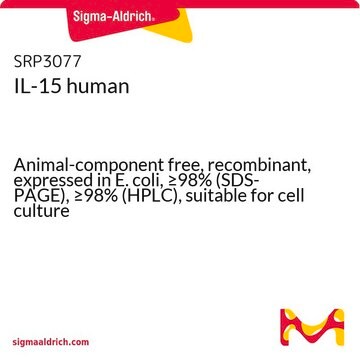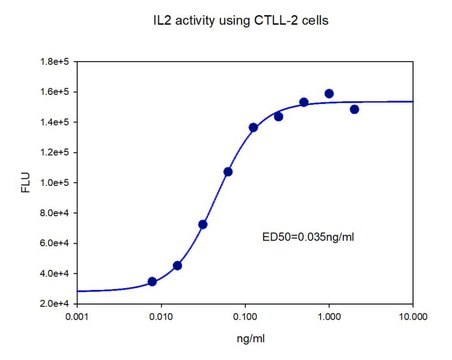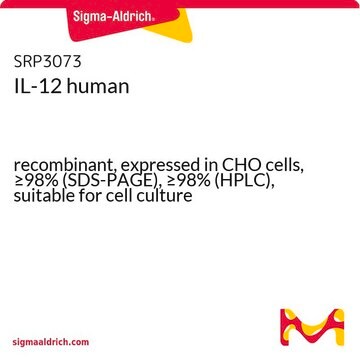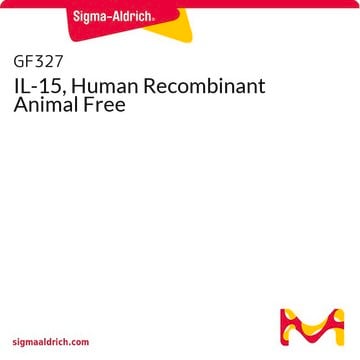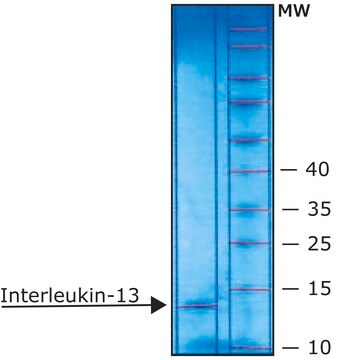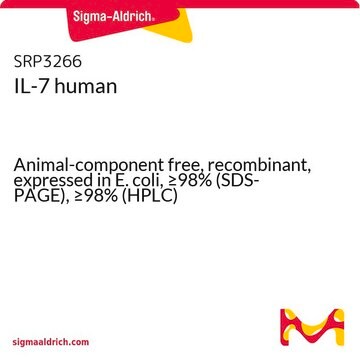I8648
Interleukin-15 human
>97% (SDS-PAGE), recombinant, expressed in E. coli, lyophilized powder, suitable for cell culture
Synonym(s):
IL-15
Sign Into View Organizational & Contract Pricing
All Photos(1)
About This Item
Recommended Products
biological source
human
Quality Level
recombinant
expressed in E. coli
Assay
>97% (SDS-PAGE)
form
lyophilized powder
potency
0.2-4.0 ng/mL EC50
mol wt
antigen predicted mol wt ~12.5 kDa
packaging
pkg of 5 μg
technique(s)
cell culture | mammalian: suitable
impurities
endotoxin, tested
UniProt accession no.
storage temp.
−20°C
Gene Information
human ... IL15(3600)
Biochem/physiol Actions
IL-15 (interleukin 15) is a proinflammatory pleiotropic cytokine and is a connection between innate and adaptive immune responses. It participates in the proliferation, survival and activation of various lymphocytes lineages. IL-15 works by associating with a high affinity heterotrimeric receptor complex containing IL-15Rα, IL-2/15Rβ and IL-Rγ. It is present in different forms, the soluble form, the hyper IL-15 formed by association between IL-15 receptor α chain and soluble cytokine, and the membrane bound isoform.
Interleukin-15 was first isolated from the supernatant of a cultured simian kidney epithelial cell line. The cDNA encodes a 162 amino acid precursor protein with a 48 amino acid signal peptide that is cleaved to yield a 114 amino acid mature protein. Human IL-15 shares sequence identity with simian (~97%) and murine (~73%). IL-15 competes for binding sites with IL-2, as both IL-2 and IL-15 stimulate the growth of cells through the IL-2 receptor.
Physical form
Lyophilized from 0.2 μm filtered solution in phosphate buffered saline, pH 7.4 with 50 μg bovine serum albumin per 1 μg as a carrier protein.
Analysis Note
Measured in a cell proliferation assay using MO7e human megakaryocytic leukemic cells. The specific activity of Recombinant Human IL-15 is approximately 4.5 x 105 U/μg, which is calibrated against recombinant human IL-15 WHO International Standard (NIBSC code: 95/554).
Storage Class Code
11 - Combustible Solids
WGK
WGK 3
Flash Point(F)
Not applicable
Flash Point(C)
Not applicable
Personal Protective Equipment
dust mask type N95 (US), Eyeshields, Gloves
Choose from one of the most recent versions:
Already Own This Product?
Find documentation for the products that you have recently purchased in the Document Library.
Customers Also Viewed
Hua Wang et al.
Medical oncology (Northwood, London, England), 32(1), 370-370 (2014-11-28)
Interleukin-15 (IL-15) is a proinflammatory cytokine involved in the proliferation, survival, and activation of multiple lymphocyte lineages. However, the prognostic significance of IL-15 for extranodal NK/T cell lymphoma (ENKTL) has not been well established. We retrospectively analyzed 112 patients with
Mario Bunse et al.
Molecular therapy : the journal of the American Society of Gene Therapy, 22(11), 1983-1991 (2014-07-23)
Genetically modified T cells that express a transduced T cell receptor (TCR) α/β heterodimer in addition to their endogenous TCR are used in clinical studies to treat cancer. These cells express two TCR-α and two TCR-β chains that do not
Alicia Santos Savio et al.
BMC musculoskeletal disorders, 16, 51-51 (2015-04-17)
Pro-inflammatory cytokines are directly implicated in the pathogenesis of Rheumatoid arthritis (RA). Variable clinical response to cytokine targeted therapies as TNFalpha and IL-6, strongly highlights the heterogeneity of inflammatory process in RA. Another cytokine, IL-15 has also been related to
K H Grabstein et al.
Science (New York, N.Y.), 264(5161), 965-968 (1994-05-13)
A cytokine was identified that stimulated the proliferation of T lymphocytes, and a complementary DNA clone encoding this new T cell growth factor was isolated. The cytokine, designated interleukin-15 (IL-15), is produced by a wide variety of cells and tissues
Jianan Zhu et al.
Frontiers in immunology, 13, 813218-813218 (2022-03-01)
Unexplained recurrent spontaneous abortion (URSA) is believed to be associated with impaired immunosuppression at the maternal-fetal interface, but the detailed molecular mechanism remains unclear. The ATP-adenosine metabolic pathway regulated by CD39/CD73 has recently been recognized to be important in immunosuppression.
Articles
Interleukins, released from leukocytes, include IL-1β playing crucial roles in inflammation, immune responses, and anti-tumor immunity.
Our team of scientists has experience in all areas of research including Life Science, Material Science, Chemical Synthesis, Chromatography, Analytical and many others.
Contact Technical Service
